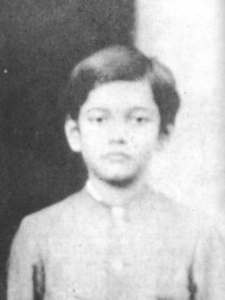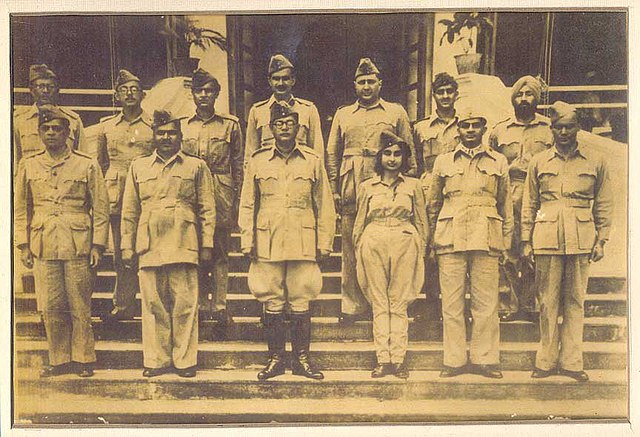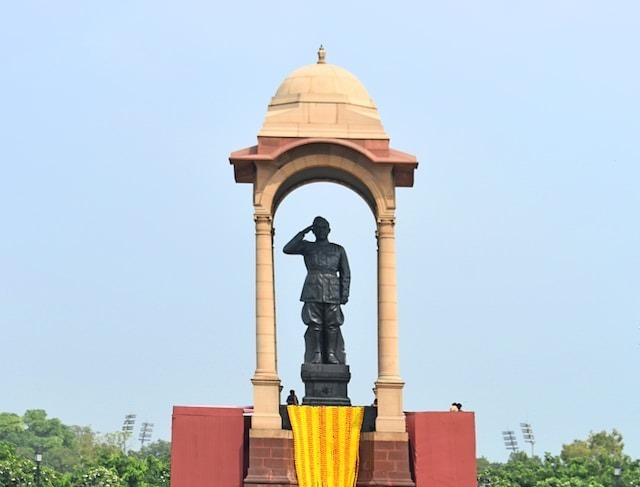Subhash Chandra Bose, a name synonymous with India’s struggle for independence, had a remarkable journey that shaped the course of the nation’s history. This blog delves into his formative years, exploring his childhood, family background, and educational pursuits, shedding light on the experiences that molded him into the iconic leader he became.
Childhood and Family Background: Born into a prominent Bengali family on January 23, 1897, in Cuttack, Odisha, Bose grew up amidst a milieu of patriotism and intellectual fervor. His parents, Janakinath Bose and Prabhavati Devi, instilled in him the values of sacrifice and service to the nation from an early age. Surrounded by a supportive family, Bose’s upbringing laid the foundation for his future endeavors.
Education in England: Subhash Chandra Bose’s quest for knowledge took him to England, where he pursued higher education. Enrolling at Cambridge University, he delved into the world of civil service examinations. His academic brilliance was apparent, setting the stage for a promising future. However, Bose’s heart was already inclined towards the larger cause of India’s freedom, prompting him to make significant life choices.
Impact on Bose’s Ideals: The exposure to Western education and ideologies significantly influenced Bose’s outlook. It sharpened his understanding of governance, human rights, and social justice, which became the cornerstone of his political beliefs. This transformative period laid the groundwork for his future political endeavors and his unwavering commitment to India’s independence.
Subhash Chandra Bose’s early life and education served as the crucible in which his revolutionary spirit was forged. The nurturing environment of his family and the intellectual stimulation in England played pivotal roles in shaping his vision for a free India. As we explore these formative years, we gain insights into the making of a visionary leader whose legacy continues to inspire generations. Stay tuned for more chapters in the saga of Subhash Chandra Bose, a true hero of India’s struggle for freedom.

Subhash Chandra Bose: A Political Trailblazer
Subhash Chandra Bose’s political career was nothing short of extraordinary, marked by a relentless pursuit of India’s freedom and a commitment to transformative change. This segment delves into his early political engagements, his role as the Mayor of Calcutta, his leadership within the Indian National Congress, and his establishment of the Forward Bloc. Each phase illuminates his vision for an independent India.
Early Political Activities: Subhash Chandra Bose’s entry into politics was ignited by his deep-rooted passion for India’s independence. In his early days, he engaged fervently with nationalist movements, voicing his concerns against British colonial rule. His magnetic personality and unwavering dedication quickly garnered attention, earning him a reputation as a dynamic leader among his peers.
Mayor of Calcutta: Subhash Chandra Bose’s political acumen was further demonstrated during his tenure as the Mayor of Calcutta. His governance strategies focused on civic development, education, and social welfare. Under his leadership, Calcutta witnessed significant infrastructural advancements, laying the groundwork for a modern, progressive city.
Leader of Congress: Bose’s influence within the Indian National Congress grew exponentially, leading to his election as its president in 1938. His leadership injected fresh vigor into the freedom movement. While advocating for complete independence, he navigated the intricate political landscape, uniting diverse factions under the common goal of a free India. His presidency marked a turning point, inspiring millions to join the fight against British tyranny.
Forward Bloc: Recognizing the need for a cohesive nationalist force, Bose founded the Forward Bloc in 1939. This organization provided a platform for like-minded individuals within the Congress, fostering unity and fortifying the resolve for independence. The Forward Bloc became a symbol of resistance, challenging the status quo and advocating for immediate freedom from British rule.
Subhash Chandra Bose’s political career stands as a testament to his visionary leadership and unwavering dedication to the cause of freedom. Through his early political activities, tenure as the Mayor of Calcutta, leadership within the Indian National Congress, and the establishment of the Forward Bloc, he carved a path toward a liberated India. His legacy endures, reminding us of the power of determination, unity, and resilience in the face of adversity.
Subhash Chandra Bose's Role in Independence Movement:
Subhash Chandra Bose’s role in the Indian independence movement was pivotal and marked by unwavering determination and strategic brilliance. He envisioned a free and united India, inspiring millions with his passionate speeches and revolutionary ideas. Bose’s commitment to the cause led him to explore unconventional avenues to combat British colonial rule. His innovative approach included forming alliances with Axis powers during World War II, aiming to weaken the British in India.
Bose’s influence extended beyond India’s borders, fostering international support for the independence movement. His ability to mobilize resources and organize movements played a significant role in energizing the struggle for freedom. Despite ideological differences within the Indian National Congress, Bose’s indomitable spirit and vision for a liberated India resonated deeply with freedom fighters across the nation.
Escape to Germany: In a daring move, Bose escaped house arrest in India in 1941, seeking international support for India’s freedom struggle. He made his way to Germany, where he sought assistance from the Axis powers, including Nazi Germany. Although controversial, this decision highlighted Bose’s audacious spirit and his willingness to explore unconventional paths to achieve independence.
Life in Germany: During his time in Germany, Bose worked relentlessly to garner support for the Indian independence movement. He established the Free India Centre in Berlin, focusing on diplomatic efforts and propaganda to raise awareness about India’s plight under British rule. Bose’s interactions with German officials and leaders from various countries demonstrated his diplomatic acumen and ability to navigate complex political landscapes.
Bose’s stay in Germany, while contentious, showcased his determination to utilize every available opportunity to further the cause of Indian independence. His experiences in Europe laid the foundation for his subsequent endeavors in Southeast Asia, where he would establish the Indian National Army (INA) and lead a valiant struggle against the British forces, leaving an indelible mark on the annals of India’s freedom movement.
Subhash Chandra Bose’s involvement in the independence movement, his escape to Germany, and his activities in Europe underscore his multifaceted approach to achieving India’s freedom. His strategic alliances and diplomatic efforts, although controversial, demonstrated his unwavering commitment to the cause. Bose’s actions continue to inspire generations, reflecting the relentless spirit of those who fought for India’s independence.
Subhash Chandra Bose's Leadership of Indian National Army:
Subhash Chandra Bose’s leadership of the Indian National Army (INA) marked a significant chapter in India’s fight for independence. Under his guidance, the INA became a formidable force, capturing the imagination of millions. Bose’s charisma and strategic brilliance inspired soldiers and civilians alike, fostering a sense of unity and determination. His leadership injected fresh vigor into the freedom movement, challenging the British Empire’s stronghold on India.
Formation of Azad Hind: The formation of Azad Hind (Free India) was a historic moment. Bose, driven by his vision of a liberated India, established the Provisional Government of Free India in Singapore on October 21, 1943. He declared war against the British Empire and called for a united effort to end colonial rule. Azad Hind Radio broadcasted his messages, rallying Indians to the cause. This bold move created a parallel government that garnered international attention and support.
INA’s First Formation: The INA’s first formation took shape in Southeast Asia, primarily in Singapore, Burma (present-day Myanmar), and Malaya (present-day Malaysia). Comprising both Indian expatriates and prisoners of war, the INA emerged as a force committed to the idea of a free India. Under Bose’s leadership, it underwent rigorous training, transforming into a disciplined and motivated army. The INA’s soldiers, driven by patriotism and a desire for independence, displayed extraordinary courage on the battlefield.
INA’s Initial Strategy: Subhash Chandra Bose meticulously planned the INA’s military strategy, aiming to launch an offensive against the British forces in India. The INA operated in conjunction with the Japanese forces, engaging in battles in Burma and the eastern front of India. Bose’s military acumen led to tactical victories, and the INA briefly hoisted the Indian tricolor on Indian soil in the town of Moirang in Manipur. Although the INA faced challenges, including supply shortages, its impact was undeniable. The INA’s efforts not only disrupted British operations but also bolstered the morale of the Indian populace.
Subhash Chandra Bose’s leadership of the INA, the formation of Azad Hind, and the INA’s initial military strategies exemplify his unwavering commitment to the cause of Indian independence. His ability to inspire, organize, and strategize transformed the INA into a formidable force, leaving an enduring legacy in India’s history. Bose’s vision and determination continue to inspire generations, underscoring his pivotal role in the fight against colonial rule.

Subhash Chandra Bose's Legacy:
Subhash Chandra Bose’s legacy is etched in the annals of Indian history as a symbol of unwavering determination and fervent patriotism. His relentless pursuit of India’s independence, characterized by his charismatic leadership and strategic acumen, continues to inspire generations. Bose’s legacy is a testament to the power of unity and the spirit of sacrifice. His unwavering commitment to the cause of freedom resonates in the hearts of millions, making him a revered figure in India’s struggle for independence.
Influence and Status within India: Subhash Chandra Bose’s influence within India remains profound. He is celebrated as a national hero, admired for his fearlessness and his ability to mobilize masses. His legacy reverberates not only in history books but also in the collective consciousness of the nation. The INA, under his leadership, demonstrated the power of unified action from people of every religion to involvement of women troups, leaving an indelible mark on India’s fight against colonialism. Bose’s legacy is often invoked in discussions about patriotism, leadership, and the relentless pursuit of one’s goals, serving as a guiding light for future generations.
Bose and Gandhi: Subhash Chandra Bose shared the stage with Mahatma Gandhi during the Indian independence movement, each representing different ideologies and approaches. While Gandhi advocated non-violence and civil disobedience, Bose believed in a more assertive, militant approach, especially during the tumultuous times of World War II. Despite their differences, both leaders shared a common goal: the liberation of India from British rule. The dynamic between Bose and Gandhi symbolizes the diversity of strategies employed in the pursuit of independence. Their interactions and ideological clashes serve as a reminder of the complexity and richness of India’s struggle for freedom, showcasing the multiplicity of voices that contributed to the nation’s ultimate liberation. Today, their relationship is studied and discussed, providing valuable insights into the nuanced dynamics of the independence movement.
Mystery of Subhash Chandra Bose's Death
Subhas Chandra Bose’s death remains shrouded in mystery and controversy, adding an intriguing chapter to his remarkable life story. His demise on August 18, 1945, following a plane crash in Japanese Taiwan, marked the end of an era, leaving behind a legacy of valiant struggle for India’s freedom. While the circumstances of his death have been widely debated, Bose’s legacy endures, reminding the world of his unwavering commitment to his ideals and the sacrifices he made for his country.
Disappearance and Alleged Death: The circumstances surrounding Bose’s disappearance and alleged death have been a subject of intense scrutiny. While official accounts state that he died in a plane crash, some theories suggest that he survived and went into hiding. Various investigations and inquiries have attempted to unravel the truth, leading to conflicting narratives and conspiracy theories. The mystery of Bose’s disappearance has captured the imagination of researchers, historians, and the public, making it a topic of endless fascination and speculation.
Investigations into Bose’s Death: Over the years, numerous investigations have been conducted to shed light on the enigma surrounding Subhas Chandra Bose’s death. Researchers and historians have delved into archives, testimonies, and eyewitness accounts, striving to uncover the truth behind his final moments. These investigations have generated diverse perspectives, ranging from confirming the official account to proposing alternative theories. The ongoing quest for clarity reflects the enduring intrigue surrounding Bose’s fate, making it a subject of continual interest and study.
Subhas Chandra Bose’s life and legacy continue to captivate the imagination of people worldwide. His contributions to India’s struggle for independence and his mysterious end have created a tapestry of historical intrigue. As researchers delve deeper into the details surrounding his death, the quest for the truth remains an ongoing journey, underscoring the enduring fascination with one of India’s most iconic freedom fighters.



